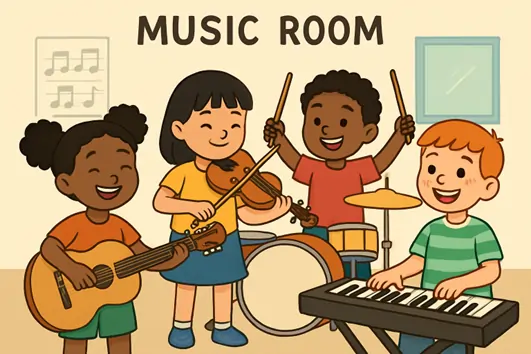Music education goes far beyond teaching children how to read notes or play instruments—it empowers youth with vital tools for life-long success. When children and teens immerse themselves in making music, they gain exposure to a form of education that stimulates both the left and right hemispheres of the brain, jumpstarting their creativity while bolstering logical thinking. Through music, young people experience growth in cognitive ability, emotional intelligence, resilience, and social skills. Many communities invest in and support accessibility to these benefits through initiatives like music education grants, helping to ensure that every child can discover the advantages of music learning regardless of their socioeconomic background or prior musical exposure. These efforts mean that the profound influence of music can extend to the broadest possible range of students, fostering inclusive opportunities and education equity.
Involvement in structured music programs does more than enrich a child’s cultural exposure. Musical instruction and participation shape critical thinking by demanding attentive listening, concentration, and creative problem-solving every time a child attends a rehearsal or lesson. Through persistent practice and the pursuit of musical mastery, students develop a sense of discipline and self-motivation that strengthens academic performance and translates into other aspects of daily life. Furthermore, music builds confidence and strengthens the kind of teamwork and emotional skills that lay a robust foundation for future academic achievement and healthy relationships throughout life. These profound and enduring impacts make a compelling case for prioritizing music education in schools and communities, as they help foster well-rounded, emotionally intelligent individuals who are better equipped to face complex challenges.
Cognitive Benefits of Music Education
Engagement with music exercises parts of the brain tied to memory, analytical reasoning, and strategic problem-solving. Learning to play an instrument or sing involves interpreting complex visual symbols (sheet music), memorizing musical passages, and developing acute listening skills, all of which enhance mental sharpness. According to USC Today, children’s brains develop more rapidly with music training, enhancing cognitive abilities across multiple domains. Research indicates that learning music enhances children’s performance in other academic areas, including mathematics and language, due to improved attention span and the benefits of multisensory learning. when students learn to analyze complex musical pieces, they develop the mental agility to understand abstract concepts and switch between different ways of thinking smoothly. The discipline of reading music, recognizing rhythms, and decoding patterns also trains young brains for abstract thinking, mental flexibility, and pattern recognition skills that directly transfer to the classroom and beyond, paving the way for academic and real-world problem-solving success.
Social Skills and Teamwork
Collaboration is at the heart of most music programs. Children participating in orchestras, choirs, or ensembles quickly realize that cohesive performances rely on mutual respect, attentive listening, and synchronization within the group. When young musicians play or sing together, they practice adapting their behavior for group harmony and expressing empathy for their peers, which strengthens cooperation. These experiences cultivate critical interpersonal skills—such as clear communication, patience, and constructive feedback—which are essential in both friendships and future work environments. Group music activities foster trust and teach young people to lean on each other in pursuit of a shared goal, skills that will benefit them whether they’re working on a school project or collaborating with coworkers as adults. Through music, students learn the value of inclusivity and shared success, developing lifelong habits of teamwork and respect.
Emotional Well-Being and Resilience
Music provides a safe and creative outlet for expressing complex emotions, reducing anxiety and fostering a strong sense of self. For many young people, performing or composing music is a healthy way of working through their thoughts and feelings, especially during challenging times. A Psychology Today article highlights how music participation can buffer youth from stress and help process emotions in healthy ways, offering relief and perspective. Overcoming performance challenges, learning from occasional failures, and expressing individuality through music all contribute to emotional maturity. These experiences help build resilience, enabling youth to face disappointments and setbacks with greater confidence and optimism. The act of persevering through difficult pieces or public performances nurtures grit. It reinforces a growth mindset, both of which are essential for long-term mental well-being and personal development.
Academic Performance Enhancement
The benefits of music education extend throughout a child’s academic journey. Mastering a musical instrument requires a disciplined practice schedule, attention to detail, and continual improvement —habits that directly support academic pursuits. Students involved in music regularly demonstrate better discipline, focus, and organizational skills, which serve them well when balancing homework, tests, and extracurricular demands. Children who participate in music lessons tend to achieve higher grades, as the skills practiced—such as attention to detail, task persistence, and time management—are essential for academic excellence. Additionally, performance opportunities and recitals teach students to manage performance anxiety, communicate under pressure, and present their work confidently—skills that translate into classroom presentations, debates, and collaborative learning projects. As a result, music-trained students often report improved grades and more positive attitudes toward learning in general.
Building Confidence and Self-Esteem
Every performance, whether on stage, in a school auditorium, or in the classroom, presents an opportunity for young musicians to gain confidence and celebrate their achievements. The process of practicing challenging music, overcoming stage fright, and achieving small yet meaningful successes helps young people develop confidence in their abilities. Each milestone, from mastering a difficult piece to performing for an audience or simply receiving encouraging feedback from a teacher, helps solidify self-esteem and motivates youth to pursue goals in other areas of their lives. The act of performing, whether solo or as part of a group, also nurtures a sense of pride and encourages healthy risk-taking. Over time, this growth in self-assurance prepares children to embrace challenges and step into leadership roles as they mature, instilling the confidence necessary to tackle academic, social, and personal hurdles throughout life.
Long-Term Career and Life Skills
The lessons learned from music education have a ripple effect, shaping successful adults far beyond the music room. From the discipline required to practice regularly and prepare for performances, to the creativity and adaptability essential for improvisation, music builds a wide-ranging skill set. Skills such as persistence, team collaboration, creative thinking, and problem-solving remain invaluable in the workforce, helping young adults navigate the complexities of adult responsibilities. Furthermore, the empathy and social awareness cultivated through shared music experiences have a positive influence on interpersonal relationships and inspire active community participation.
Conclusion
Music programs are more than just a source of artistic enrichment—they are crucial investments in youth development that reap dividends across a person’s lifespan. Whether a student becomes a professional musician or simply carries a passion for music into adulthood, the benefits of a musical education are clear and far-reaching. Through the pathways of cognitive growth, social bonding, emotional resilience, and the mastery of life skills, music education prepares young people not just for exams but for the diverse challenges and opportunities they will encounter as adults. Supporting wide access to music education ensures that the next generation is well-equipped not only for academic achievement, but also for a successful, balanced, and fulfilling life shaped by creativity, connection, and confidence.
Read more: Employee Rights in the Modern Workplace – Croudmomentum.com
How Digital Mockups Help Designers Avoid Printing Mistakes – Croudmomentum.com
Get a Natural-Looking Smile with Composite Bonding Newcastle – Croudmomentum.com








